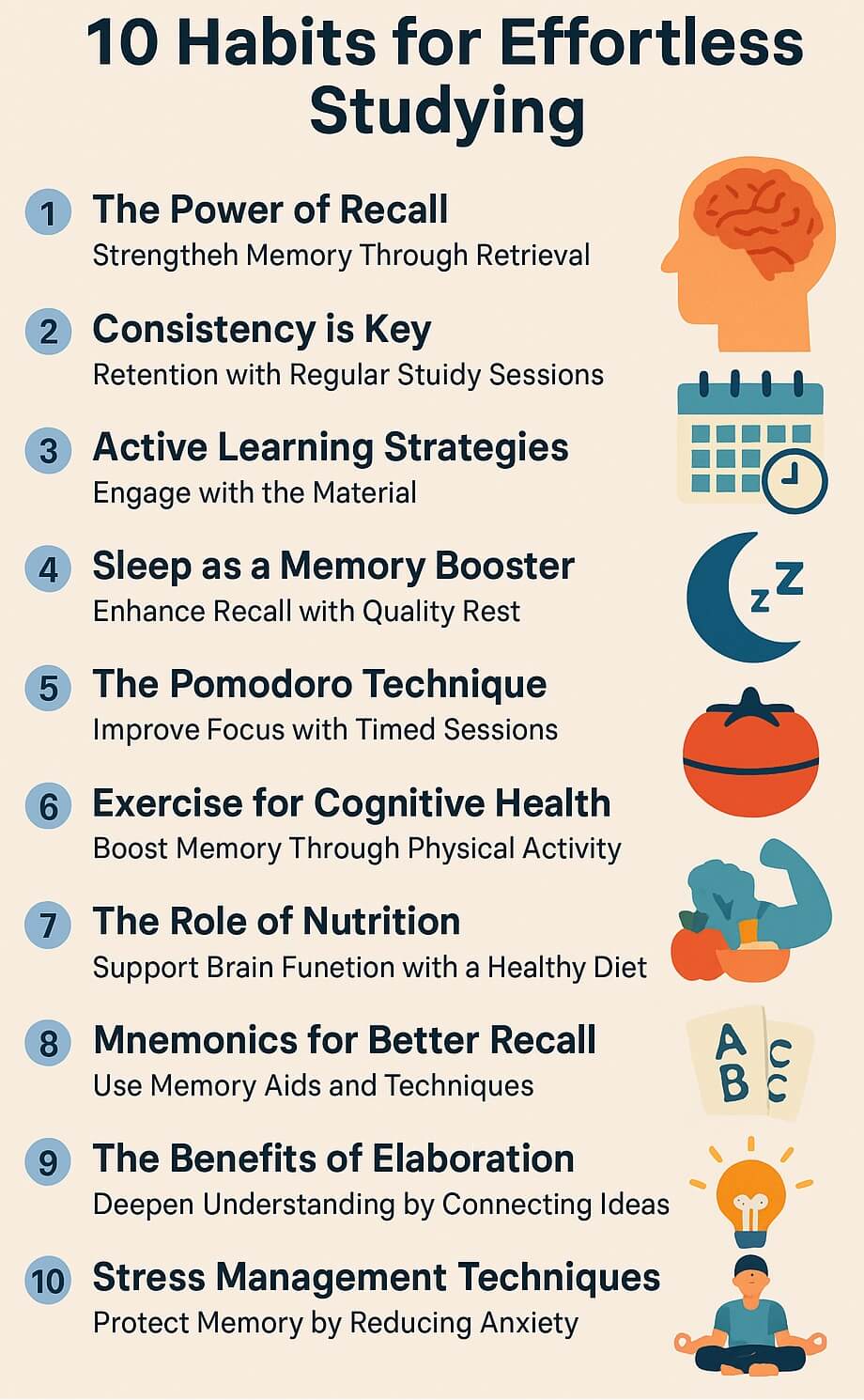
Many students spend hours going through textbooks and notes only to feel blank during an exam. If this sounds familiar, you're not alone. Forgetting is natural, but understanding how to work with your memory rather than against it can make a big difference.
Memory isn’t a talent you’re born with—it’s a skill you can improve. Just like you train your muscles to get stronger, your brain needs certain habits to retain information effectively. These habits, supported by neuroscience and real-world application, offer a practical way to make learning stick.
Table of Content
- Habit 1: Practice Active Recall
- Habit 2: Space Out Your Study Sessions
- Habit 3: Teach What You Learn
- Habit 4: Link New Information to What You Know
- Habit 5: Use Mnemonics and Memory Devices
- Habit 6: Create a Dedicated Study Environment
- Habit 7: Take Breaks—Don’t Power Through
- Habit 8: Get Enough Sleep
- Habit 9: Eat Foods That Support Brain Function
- Habit 10: Move Your Body to Support Your Brain
- Start Small, Stay Consistent
- Conclusion
- Frequently Asked Questions
|
Habit Number |
Habit |
Brief Description |
|
1 |
The Power of Recall |
Actively retrieving information from your brain is like exercising a muscle; it gets stronger with use. |
|
2 |
Space It Out |
Instead of cramming, spread your study sessions over time. Your brain will thank you! |
|
3 |
Become the Teacher |
Explaining what you've learned to someone else is a fantastic way to solidify your own understanding. |
|
4 |
Connect the Dots |
Linking new information to what you already know creates stronger memory pathways. |
|
5 |
Memory Tricks That Stick |
Use fun and creative techniques like mnemonics to make information easier to remember. |
|
6 |
Your Study Sanctuary |
A calm and organized study space can significantly improve your focus. |
|
7 |
Recharge and Remember |
Taking regular breaks prevents burnout and keeps your mind sharp. |
|
8 |
Sleep Your Way to Success |
Getting enough sleep is essential for your brain to process and store memories. |
|
9 |
Fuel Your Mind |
What you eat greatly affects your brain's ability to function and remember. |
|
10 |
Get Moving |
Physical activity isn't just for your body; it's great for your brain too! |
Habit 1: Practice Active Recall
Your brain remembers better when it works harder to retrieve information. Instead of rereading notes, test yourself.
Use flashcards, quiz yourself without looking at your materials, and write down what you remember about a topic before checking the facts. This will strengthen the mental pathways that store knowledge.
In one study published in Science, students who used active recall outperformed those who reread materials by more than 50%.
Habit 2: Space Out Your Study Sessions
Cramming the night before a test often leads to quick forgetting. However, reviewing material at spaced intervals reminds your brain that that the information matters.
This technique is called spaced repetition. For example, you might study something on Monday, review it on Wednesday, review it again on Saturday, and repeat it again the following week. Apps like Anki and Quizlet can help you manage this system automatically.
Habit 3: Teach What You Learn
Explaining a concept out loud—whether to a friend or an imaginary audience—forces you to understand the topic deeply.
This method, often called the "protégé effect," turns you into a mini-expert. The act of simplifying complex topics makes them clearer in your mind. Try using the Feynman technique: explain a topic in plain language as if teaching a child.
Habit 4: Link New Information to What You Know
Making connections is how the brain learns. When new facts relate to things you already understand, they become easier to remember.
For instance, when learning about the human heart, think of it as a pump, similar to one used to inflate a tire. These comparisons strengthen your mental associations.
Creating mind maps and diagrams also helps by showing how different ideas connect. This gives your brain more “hooks” to recall the material later.
Habit 5: Use Mnemonics and Memory Devices
Mnemonics turn boring facts into memorable phrases. Think of “HOMES” to remember the Great Lakes—Huron, Ontario, Michigan, Erie, and Superior.
Other examples include:
-
Acronyms: Short words formed from initial letters.
-
Rhymes: Songs or jingles make facts easier to recall.
-
Visualization: Picture a vivid mental image. The stranger, the better—it sticks.
Techniques like the “memory palace” (imagining placing items in familiar rooms) are used by memory champions around the world.
Habit 6: Create a Dedicated Study Environment
Where you study matters; a quiet, clean, well-lit space helps your mind focus.
Declutter your desk. Turn off phone notifications. Try to use the same location for studying—your brain starts to associate that spot with learning.
Some students benefit from changing their location once in a while for better memory encoding, but avoid overly noisy or distracting environments.
Habit 7: Take Breaks—Don’t Power Through
The brain can only focus for a certain amount of time. Research shows that most people can focus for 25–30 minutes before losing concentration.
Try the Pomodoro method: Study for 25 minutes, followed by a 5-minute break. After four cycles, take a longer break. Use this downtime to relax, stretch, or take a short walk.
Breaks let your brain recharge and improve long-term memory formation.
Habit 8: Get Enough Sleep
Memory is strengthened during sleep. When you learn something new, your brain continues working on it while you rest.
Getting 7–9 hours of sleep per night helps store new information in long-term memory. Even short naps can give a quick memory boost, especially after a study session.
Avoid all-nighters—they reduce the brain's ability to retain and recall information.
Habit 9: Eat Foods That Support Brain Function
What you eat affects how your brain works. Nutrient-rich foods like berries, nuts, fish, and green leafy vegetables have been shown to improve memory.
Drink plenty of water—dehydration can lead to fatigue and forgetfulness. Omega-3 fatty acids, found in fatty fish and flaxseeds, support healthy brain cells.
Avoid sugar-heavy snacks that cause energy crashes and cloud thinking.
Habit 10: Move Your Body to Support Your Brain
Exercise helps more than your muscles—it also supports memory. Physical activity increases blood flow to the brain and boosts cognitive performance.
Studies show that 20 minutes of aerobic exercise can improve memory and focus. Regular movement, such as walking, cycling, or yoga, can also reduce stress and improve concentration.
Start Small, Stay Consistent
You don’t need to use all ten habits at once. Choose one or two to begin with. Once they become part of your routine, add more.
Keep a journal or planner to track your progress. Reflect on what’s working and what’s not, and adjust your approach based on your needs.
Real change happens over time, not overnight. The goal is consistency, not perfection.

Conclusion
Better memory isn’t something only a few people have. Anyone can improve it through intentional, repeatable habits. These strategies—testing yourself, spreading out study sessions, eating well, moving your body, and sleeping enough—build a learning system that works.
Your memory is not fixed. It’s flexible. It responds to how you treat it.
The good news is, with a few small changes, remembering what you study can become much more manageable.
Frequently Asked Questions
1. Which memory technique works best for exams?
A mix of active recall and spaced repetition usually gives the best results. Try flashcards and practice tests a few days apart.
2. How can I stay focused when studying?
Set up a quiet space, limit distractions, and use short study sessions with breaks. The Pomodoro method helps many students stay on track.
3. Does listening to music help with memory?
Instrumental music or ambient sounds may help some people concentrate, but lyrics can be distracting. Try both and see what works best for you.
4. What should I eat before a study session?
Opt for whole grains, nuts, or fruit. Avoid sugary snacks. Hydration is just as important, so drink water regularly.
5. How long should I study in one session?
Aim for 25–30 minutes of focused work, then take a 5-minute break. After four sessions, take a longer 15–30 minute break to reset.
Study Tips Study Motivation




